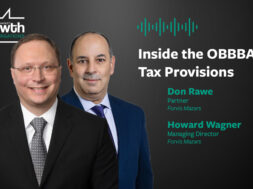Middle-Market Public Policy Roundup
The House asks to restrict aid to companies with private capital backing, the SEC provides relief for small and midsize businesses, and a deadline for Volcker Rule comments is extended.

In this week’s roundup, the House Financial Services Committee sends a letter to policymakers rolling out the multitrillion-dollar aid package asking them for restrictions on aid to companies with private capital backing. In addition, the Securities and Exchange Commission decides to implement some relief for small and midsize businesses by opening up more investment from business development companies. Plus, a deadline for comments on the Volcker Rule rollback is extended in response to COVID-19 concerns.
Financial Services Committee Weighs in on Paycheck Protection Program Funds and Private Equity
House leaders said they want stricter regulation for small businesses with private equity backing that are seeking aid.
The Coronavirus Aid, Relief, and Economic Security Act, or CARES Act, created the Paycheck Protection Program, or PPP, to provide loans to small businesses. But in a letter sent on April 2 from Chairwoman of the House Committee on Financial Services Maxine Waters, D-Calif., to Treasury Secretary Steven Mnuchin and Small Business Administration Administrator Jovita Carranza, Waters urged them to adopt guidance that prohibits federal funds from directly benefiting investors.
“Any funds granted through [the paycheck protection program] must not be used to pay any debts or obligations to private funds, including management or consulting fees,” Waters said.
The chairwoman added that companies seeking a loan from PPP should keep employees on their payrolls, provide paid leave and implement a corporate governance structure that includes worker representation on corporate boards.
The letter came as policymakers work out details around how companies with private equity and venture capital backing fit into the relief package.
According to analysis by the Congressional Research Service, some small businesses might be ineligible for PPP loans, despite falling below the 500-worker threshold because of the SBA’s “affiliation rules.”
Based on those rules, an investor could be deemed to have control of multiple businesses. If collectively the businesses employ more than 500, all of the affiliated businesses under that investor’s control would be ineligible for SBA aid.
However, there are some exceptions to the rule, including for PE-backed businesses that receive financial assistance through the SBA’s Small Business Investment Company program.
SEC Provides Relief for BDCs that Invest in Small and Midsize Businesses
The Securities and Exchange Commission announced that it is providing relief for business development companies, or BDCs, to enable them to make additional investments in small and medium-sized businesses, including those with operations affected by COVID-19.
Briefs
More Relief for SMEs Could Be on Its Way
Policymakers are considering more funding to the already record-breaking stimulus package.
After passing the $2.2 trillion CARES Act late last month, House Speaker Nancy Pelosi, D-Calif., and Senate Minority Leader Chuck Schumer, D-N.Y., proposed a new round of funding that would benefit small businesses, according to a report from The Wall Street Journal.
The Trump Administration is also seeking $251 billion for small business loans that would supplement $350 billion already earmarked for relief.
The relief will provide additional flexibility for BDCs to issue and sell senior securities in order to provide capital to such companies, and to participate in investments in these companies alongside private funds.
The aid is subject to investor protection conditions, the SEC said, including specific requirements for obtaining an independent evaluation of the issuances’ terms and approval by a majority of a BDC’s independent board members.
“Many small and medium-sized businesses across the country are struggling due to the effect of COVID-19, and today’s temporary, targeted action will enable BDCs to provide their businesses with additional financial support during these times,” SEC Chairman Jay Clayton said in a statement.
BDCs generally provide capital to smaller domestic operating companies that otherwise may not be able to access capital markets.
Unlike a private equity firm, a BDC is not required to return principal funds to limited partners within a fixed time period. Instead, it delivers value to shareholders through dividends, which are issued periodically.
Agencies Extend Comment Period for Volcker Rule Changes
Five federal financial regulatory agencies on Thursday announced that they will consider comments submitted before May 1 on their proposal to modify the Volcker Rule’s general prohibition on banking entities investing in or sponsoring hedge funds or private equity funds—known as “covered funds.”
Originally requiring that comments be made by April 1, the agencies that include the Federal Reserve, the Office of the Comptroller of the Currency and the Securities and Exchange Commission will continue to consider comments to provide more time to analyze the issues and prepare their comments in light of potential disruptions resulting from the coronavirus, they said in a statement.
The proposed amendments, which were made in February, would roll back some exclusions that have prevented banks from investing in covered funds, such as venture capital funds.
According to the agencies, the proposed rule would create new exclusions from the definition of a covered fund for credit funds—which under the current proposal includes some venture capital funds—and family wealth management vehicles, but not private equity.

Benjamin Glick is an associate editor of Middle Market Growth.


